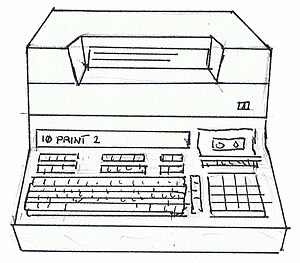 Image via Wikipedia
Image via WikipediaThis year is the fifteenth that I have been working with business process management, document management and business information systems. Or when people ask what I do, "I'm in IT, but I can't fix your PC". Over the years not much has changed. The same business problems are still there. Companies still have an over-reliance on paper or email, because it is just too hard to get started in a process improvement project. Communications with customers are still on paper. Yep, you can get your bank statement online, but that isn't a transaction that results in a business process. Nope, processes are still manually guided by individuals driving a desk and an email account. Am I a fool to think that people want to change this?
In the last two years, I have been focusing more on small and mid-sized businesses. They seem to offer a great opportunity, hanging on through grim economic times, and needing some attention to be able to work better. The problem is that there is never a lot of money or time to spare in small businesses to change the way things are done. Rightfully, people focus on doing what needs to be done right now, trying to grow the business (or just stay afloat). The idea of adding some process rigor, to make it easier to do common repetitive tasks in the future, just doesn't figure. In many cases, a process incorporates a grand total of one employee and a customer. A checklist is a more effective process management tool than a formal workflow, and managing information, data and documents with minimal hassle is a much bigger issue.
Mid-sized businesses have process needs that are reminiscent of the processes I have worked with in giant corporations. Since the multinational monsters are always split into business units and smaller departments, the scale of what needs to be done is often the same as the requirements of a mid-sized company anywhere in the world. Which is great news, as that means I have some great experience to offer these smaller companies from my time spent with the big guys.
The problem is this: it is far more transparent where the cash comes from to pay for business improvement in a mid-sized company than a multinational corporation -- the owner's bank account. In large corporations, you can make an ROI and justify it two levels above you, and you're still not even in the peripheral vision of the CEO. In a mid-sized company, the ROI has to be real, and offer real results.
So am I just fooling myself trying to work with mid-sized businesses? Or will the lessons of transparent decision-making make me into a better process improvement specialist? My job is no longer in fabricating an ROI for an enterprise software salesman to present to his prospect in the department of a huge company. My job is to recognize that mid-sized businesses have process problems that need fixing, in sensible, justifiable ways. And if you can't justify making a change, things will carry on fine just the way they are.
Reality is, in 15 years my job hasn't changed. I'm still "in IT, but can't fix your PC". I just have to focus on the real business problems, not the ones that used to make a salesman a fat commission!
A post from the Improving It blog
Let us help you improve your business today. Visit www.consected.com

2 comments:
I think this is the problem of all independent consultants - proving your worth when budgets are tight. As a process improvement specialist you can see what the opportunities are for big savings but making that real to your potential client is often difficult. But I think you are right to continue on the path of helping those who really have the need.
I think you nailed it when you stated that in order to be feasible you have to show the ROI. That is typical of business. To help bolster your credentials take a look at the University of San Francisco's online business process management certificate program found here: http://www.usanfranonline.com/online-certificates/business-process-management.aspx
Post a Comment